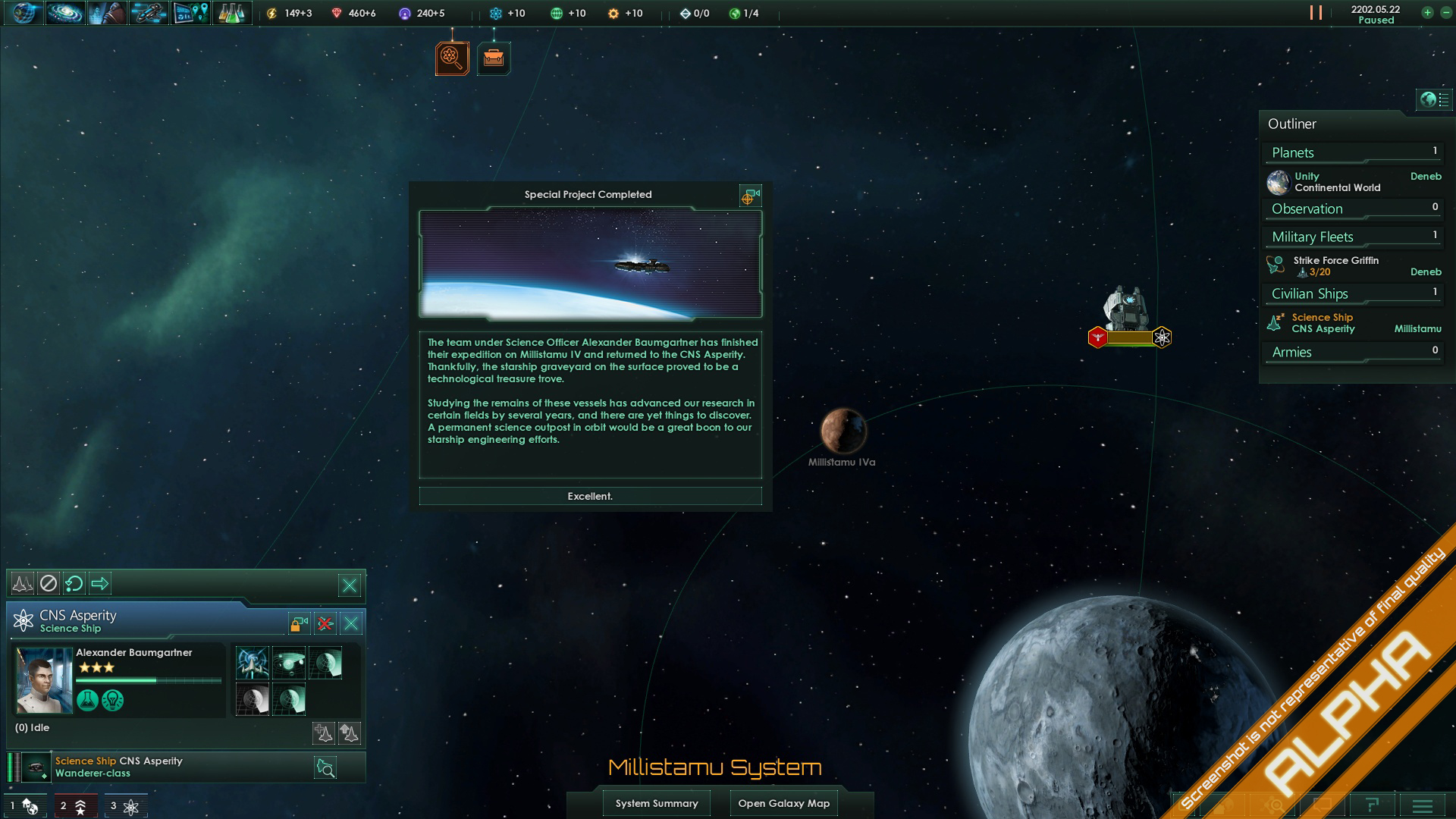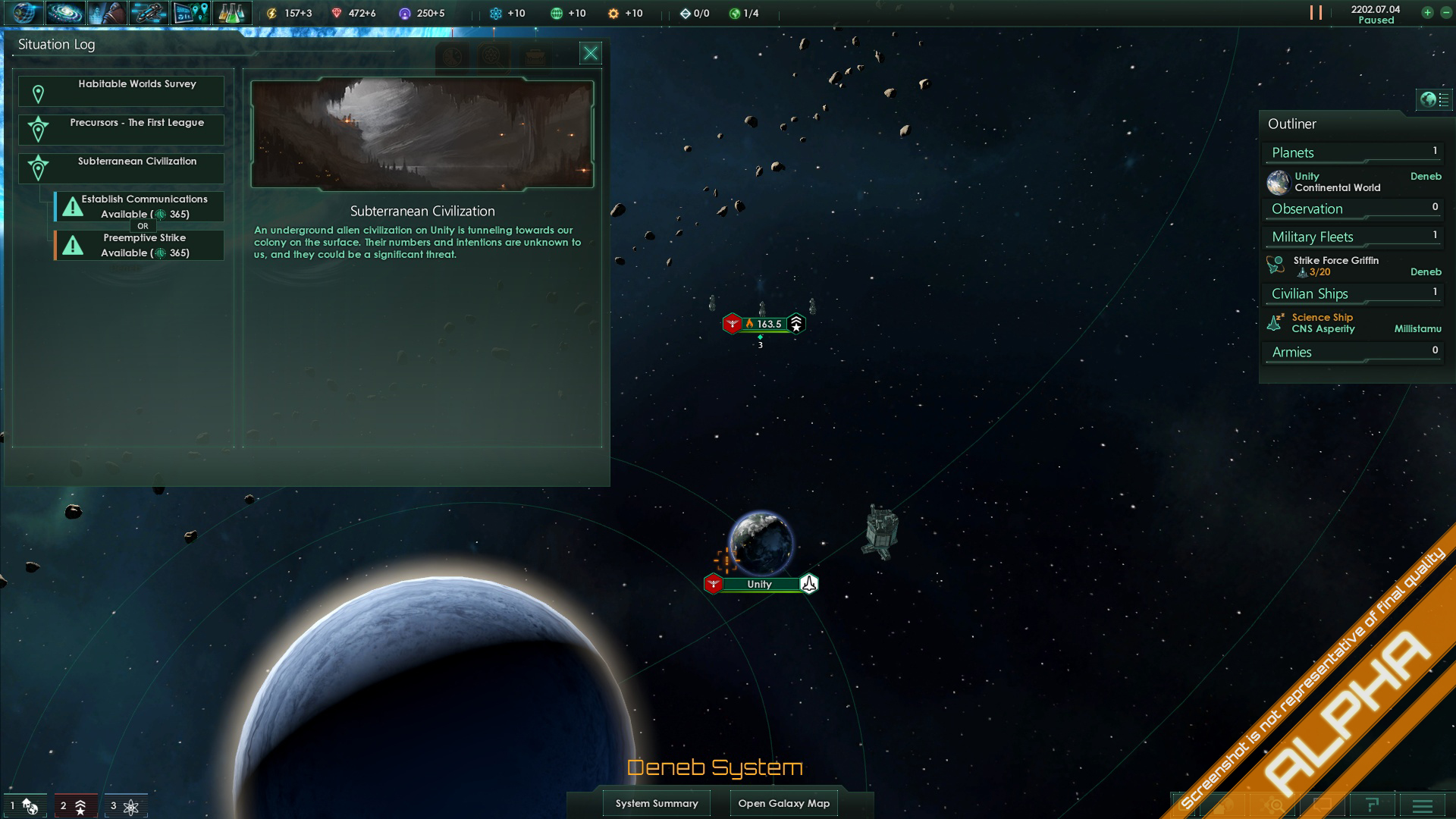Fellow sentients!
Do not be alarmed. I have been summoned to yourpitiful quaint planet to tell you a little bit about Special Projects and the Situation Log.
As you play the game and venture out into the galaxy, you will eventually come upon Special Projects. These projects are sometimes spawned by the Anomalies that were discussed in last week’s Dev Diary, but they can also be triggered by other events. They typically represent a specific action that can be performed by the player, and in that respect they function a bit like the decisions you might find in some of our other games.
Most projects are centered around a location (often a planet, but it could also be an object in space), and many require the presence of a Science Ship and a skilled Scientist before they can be started. Others may require the presence of a warship, or a troop transport, or something else entirely. It depends on the project.

While the cost of some projects is only a time investment, others will require research efforts within a particular field, such as physics, to complete. Technology research progress is diverted to the project at the expense of your current technology research in that field, temporarily halting all progress. In other words, you may want to hold off on that physics project for a while if you are just about to finish researching a new shield system!
A few examples of Special Projects could be boarding and investigating a derelict space hulk, performing an archeological dig on the homeworld of a dead civilization… or perhaps fishing something out of the atmosphere of a gas giant. Projects can also appear on your colony worlds, and they may be time sensitive.
So what do you get for completing a Special Project? Well, at the risk of sounding like a broken record, that depends on the project. You might get an advanced alien warship, or a new technology, or any number of other bonuses and advantages. Sometimes the reward might simply be staving off an imminent disaster on one of your colonies.
To help players keep track these projects, we have added something called the Situation Log to the game. This screen works like a quest log in many ways, and you will find all currently available Special Projects here. You can also follow your progress in certain event chains, with various Points of Interest listed that can be visually tracked on the map. A Point of Interest could be a strange signal emanating from a distant star system, which will remain in your log until you send someone to investigate.

That’s it for now. Next week, renowned interstellar gangster Daniel “grekulf” Moregård will take time out of his busy schedule to tell you more about how planets work in Stellaris - including planet modifiers, surface tiles, buildings and resource collection!
Do not be alarmed. I have been summoned to your
As you play the game and venture out into the galaxy, you will eventually come upon Special Projects. These projects are sometimes spawned by the Anomalies that were discussed in last week’s Dev Diary, but they can also be triggered by other events. They typically represent a specific action that can be performed by the player, and in that respect they function a bit like the decisions you might find in some of our other games.
Most projects are centered around a location (often a planet, but it could also be an object in space), and many require the presence of a Science Ship and a skilled Scientist before they can be started. Others may require the presence of a warship, or a troop transport, or something else entirely. It depends on the project.

While the cost of some projects is only a time investment, others will require research efforts within a particular field, such as physics, to complete. Technology research progress is diverted to the project at the expense of your current technology research in that field, temporarily halting all progress. In other words, you may want to hold off on that physics project for a while if you are just about to finish researching a new shield system!
A few examples of Special Projects could be boarding and investigating a derelict space hulk, performing an archeological dig on the homeworld of a dead civilization… or perhaps fishing something out of the atmosphere of a gas giant. Projects can also appear on your colony worlds, and they may be time sensitive.
So what do you get for completing a Special Project? Well, at the risk of sounding like a broken record, that depends on the project. You might get an advanced alien warship, or a new technology, or any number of other bonuses and advantages. Sometimes the reward might simply be staving off an imminent disaster on one of your colonies.
To help players keep track these projects, we have added something called the Situation Log to the game. This screen works like a quest log in many ways, and you will find all currently available Special Projects here. You can also follow your progress in certain event chains, with various Points of Interest listed that can be visually tracked on the map. A Point of Interest could be a strange signal emanating from a distant star system, which will remain in your log until you send someone to investigate.

That’s it for now. Next week, renowned interstellar gangster Daniel “grekulf” Moregård will take time out of his busy schedule to tell you more about how planets work in Stellaris - including planet modifiers, surface tiles, buildings and resource collection!





